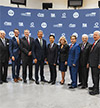Regional Report: Georgia - An International Business Destination
Foreign direct investment and global trade have had a huge impact on economic development in the state of Georgia.
Q3 2019

These attributes garner attention from domestic and foreign companies alike. In 2018, investment in Georgia from foreign companies totaled about $3 billion, or 41 percent of all investment in the state for that year. Over the last five years, from 2013 to 2018, 429 foreign investment projects were launched that accounted for $8.63 billion in investment and 32,644 jobs created.
Key reasons behind this impressive economic development are Georgia’s modern infrastructure, access to global markets, and well-developed logistics and distribution networks. Georgia is located at the intersection of major north-south and east-west travel routes, which help move shipments quickly and efficiently via air, highway, rail, and port to global markets. About 80 percent of all U.S. consumers are located less than a two-day drive from Georgia.
The state is also top-ranked for its distribution and supply chain hubs. Hartsfield-Jackson Atlanta International Airport is the busiest airport in the world, with total cargo warehouse space of 1.3 million square feet. Not far away is the Port of Savannah, the largest single container terminal in North America and the second-busiest U.S. container port.
AIT Group, a Spanish firm, is constructing its first U.S. manufacturing operation in Augusta. The 220,000-square-foot plant will manufacture and distribute its heavy-duty brake systems to customers within the North American automotive market.
“We chose to locate in Georgia for several reasons, including proximity to our customers and potential markets and accessibility through the airport, the Port of Savannah, and the state’s highway network,” notes Antonio Pomés, president of AIT Group USA Inc.
World-Class Workforce Draws Investment
Plentiful and highly skilled labor is always a top consideration in any location decision. Georgia provides a deep pool of talent, including 95,000 new professionals who graduate each year from Georgia’s 85 universities, colleges, and technical institutes across the state. Georgia Institute of Technology offers one of the top industrial engineering programs in the nation, and the collaborative biomedical engineering program between Emory University and Georgia Tech consistently ranks among the top three.
Workers with technology skills are in high demand, especially for certain industries, such as financial technology (fintech). In fact, it’s estimated that nearly 70 percent of all financial transactions on a global scale pass through companies headquartered in metro Atlanta.
In May 2019 Invesco, a leading investment management firm, announced plans to undertake a $70 million expansion of its global headquarters in Atlanta, adding 500 jobs — confident it will find the fintech talent it needs.
However, one challenge that Georgia faces is that outside of the Atlanta area, “economic growth is constrained by low workforce participation and a lack of access to opportunities in high-growth sectors,” according to a recent report from McKinsey and Company. “Since regions typically prosper when they are easily connected to major economic hubs, investing in high-potential sectors and connecting them to both in-state and wider markets can create positive economic effects,” the report further notes.
Global trade has a truly statewide impact and companies in every region of the state contribute to Georgia’s export growth. Pat Wilson, commissioner, GDEcD Customized workforce training is one way to stimulate economic growth and create regional connections. Georgia’s Quick Start program is consistently ranked as one of the top training programs in the country. The program is available to qualified companies that meet or exceed predetermined thresholds for new job creation. This is especially beneficial for large facilities (often manufacturing) that hire hundreds or even thousands of workers, often in rural areas. Working with local colleges, Quick Start creates customized training for new workers that is delivered in classrooms, mobile labs, or company facilities.
More than one million employees in Georgia have been trained by Quick Start. The training is provided at no cost for qualified companies — another benefit for foreign companies that may not be familiar with hiring and training practices in the U.S.
Big Investments Roll In
Key industries in Georgia are agribusiness, automotive, aerospace, advanced manufacturing (machinery, electrical equipment and components, and fabricated metals), medical devices, food processing, and logistics and transportation. Agricultural exports held steady at $4.2 billion. Aerospace remained the leading export industry in Georgia with exports totaling more than $9.1 billion in products. Exports of medical devices and pharmaceuticals grew 13 percent to a record $1.7 billion. Combined advanced manufacturing sectors contributed $61.1 billion in output.
Georgia’s advanced technology sector continues to attract big, foreign-based investment projects. For example, SK Innovation, a South Korean firm, will invest $1.67 billion to build an electric vehicle battery factory in Jackson County, Georgia, with operations scheduled to start in 2022. The facility will be the company’s first electric battery factory in the U.S. and is one of the largest job-creating initiatives in Georgia’s history, creating more than 2,000 jobs.
Customized workforce training is one way to stimulate economic growth and create regional connections. And thyssenkrupp Elevator has started construction on its Innovation and Qualification Center, a 420-foot-tall building in Atlanta that will be part of its new North American headquarters. With 18 shafts, the test tower will be used to test new elevator designs, including high-speed elevators, an elevator system that features two cabins working independently in one shaft, and an innovative “ropeless” and sideways-moving elevator system. When completed in 2021, the center will be the tallest elevator test tower in the U.S.
Export/Import Relationships
Many of the foreign investments in Georgia are the result of relationships with foreign countries that Georgia has developed through trade missions and other methods of outreach. Georgia has strong representation in Brazil, Canada, Chile, China, Colombia, Europe, Israel, Japan, Korea, Mexico, Peru, the United Kingdom, and Ireland. These long-term relationships have built trust and facilitated international understanding, collaboration, and economic development. Not only do these foreign partners invest in Georgia, they buy Georgia goods — in fact, 60 percent of Georgia’s total exports are sold in these countries.
The Georgia Department of Economic Development’s (GDEcD) International Trade Division works hard to develop export/import relationships and assists Georgia companies to understand global markets and diversify their customer bases. The results have been impressive — Georgia’s 2018 international trade numbers set a new state record. Trade between Georgia and 223 countries and territories reached a new high of $139.3 billion.
“Global trade has a truly statewide impact and companies in every region of the state contribute to Georgia’s export growth,” says Pat Wilson, commissioner of GDEcD. “I am extremely proud of the efforts of our international trade team, which works closely with companies, communities, and economic development partners statewide to ensure Georgia’s continued competitiveness.”
Project Announcements
La Colombe Coffee Roasters Expands Norton Shores, Michigan, Operations
02/23/2026
GRVTY Plans Tysons, Virginia, Headquarters Operations
02/23/2026
Hudson Industries Expands Appleton City, Missouri, Operations
02/23/2026
Israel-Based Katz 1899 Plans Dayton, Ohio, Manufacturing Operations
02/23/2026
Chick-fil-A Supply Plans Winter Haven, Florida, Logistics-Distribution Operations
02/17/2026
Annandale Millwork and Allied Systems Plans Newport News, Virginia, Operations
02/17/2026
Most Read
-
Top States for Doing Business in 2024: A Continued Legacy of Excellence
Q3 2024
-
Data Centers in 2025: When Power Became the Gatekeeper
Q4 2025
-
Speed Built In—The Real Differentiator for 2026 Site Selection Projects
Q1 2026
-
Preparing for the Next USMCA Shake-Up
Q4 2025
-
The New Industrial Revolution in Biotech
Q4 2025
-
Strategic Industries at the Crossroads: Defense, Aerospace, and Maritime Enter 2026
Q1 2026
-
The Skilled Trades Are Ready for a Digital Future
Q4 2025



